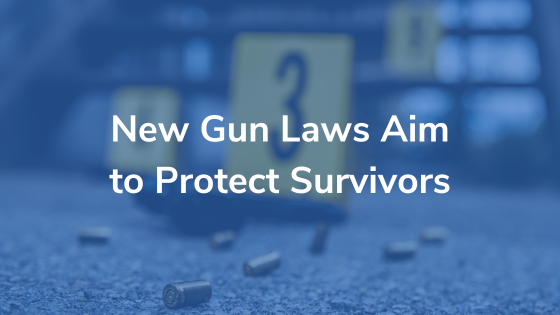Michigan’s New Gun Laws Aim to Protect Survivors
Governor Gretchen Whitmer has signed legislation aimed to keep guns out of abusers’ hands, 24 years after the tragic death of Maggie Wardle, a teenager who was killed with a gun by an ex-boyfriend.
Stories like Maggie’s are all too common. Every year in the United States, more than 600 women are shot to death by intimate partners – roughly one every 14 hours. In fact, firearms are used to commit more than half of all intimate partner homicides in America. The danger extends beyond a partner – in more than half of mass shootings where four or more people were killed, the shooter killed an intimate partner.
Permitting convicted abusers to have firearms poses a grave risk to the general public and the lives and well-being of their partners and ex-partners. An abusive partner’s access to a firearm makes it five times more likely that they will kill their partner.
In the nearly 24 years that have passed since her death, Maggie’s mother and stepfather, Martha and Rick Omilian, have traveled the state to advocate for gun reform — like the legislation recently signed into law by Governor Gretchen Whitmer.
“A convicted domestic violence offender, male or female, has shown by their past behavior that access to a firearm is not appropriate,” Rick Omilian said. “This is not a violation of their rights or a threat to those who are responsible gun owners. But it is a reasonable action due to the past behavior and the history of the abuser.”
What is the legislation?
The legislation, Senate Bills 471 and 528 and House Bill 4945, suspends access to guns for those convicted of domestic violence. Those subject to the ban would be prohibited from buying, owning, or transporting firearms for eight years.
“These bills are based on a simple idea. If you have been found guilty in court of violently assaulting your partner, you should not be able to access a deadly weapon that you can use to further threaten harm or kill them.” – Governor Gretchen Whitmer
State law already prohibited those convicted of felonies — including domestic violence felonies — from owning a gun three to five years after they complete their sentence. But there was no state law banning those convicted of misdemeanor domestic violence from owning a gun. There is a federal ban that does that, but gun reform advocates argue it does not apply to all domestic abusers and relies on limited federal resources for enforcement.
Michigan is the 34th state with laws on the books temporarily banning anyone convicted of domestic violence misdemeanors from owning guns. States that restrict access to guns by people subject to active domestic violence restraining orders have seen a 13% reduction in intimate partner homicides involving firearms.
Resilience’s Advocacy
Resilience stands unwavering on the frontlines, tirelessly advocating for these crucial protections for survivors. Dedicated members of the Survivor Advisory Council led Resilience’s charge to passionately champion this legislation each step of the way. They have fearlessly lent their voices to public rallies and committee hearings, ensuring that the concerns and needs of other survivors are not just heard, but given the attention they deserve. We give our deepest gratitude to the survivors of gun violence that have bravely re-lived their trauma in an effort to help others.
